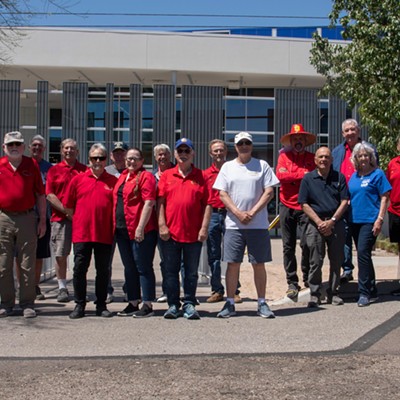El Tiradito Shrine is full of red candles that won't be lit. After being smudged with sage, 20 men and women form the circle, as close together as their umbrellas allow. The umbrellas are red, a symbol of sex workers' human rights.
"We're here honoring, remembering the lives of our colleagues who have been slain in the previous year," said Juliana Piccillo, a former sex worker and a member of Sex Workers Outreach Project (SWOP), a national social-justice network that advocates for sex workers. "It's stigma and criminalization that's directly responsible for the deaths of sex workers."
Piccillo and fellow SWOP member Viv wrote the Dec. 17 invocation for International Day To End Violence Against Sex Workers: We come to this circle with our pain. We come to this circle with our strength.
A small group of Tucsonans has gathered at El Tiradito for the last 15 years to honor the women whose lives have been cut short. Kym reads the names, compiled by SWOP, of 53 sex workers who've been murdered, committed suicide or have gone missing since last Dec. 17.
Sex workers rarely report assault or threats because all too often police are part of the problem. One study by the Urban Justice Center, a non-profit legal services and advocacy organization serving the New York City area, found that the majority of street-based sex workers experienced police abuses and a systemic disregard for the violence committed against them.
"Police are responsible for 99 percent of fear in our industry," Piccillo told me at a coffee shop, a couple days before the vigil. "When we're harmed, we're told it's part of our job description."
Stigma around sex work is not exempt from courtrooms either. In many states, being a prostitute is allowed as character evidence against rape victims, according to SWOP. A Philadelphia judge, Teresa Carr-Deni, went so far as to charge a sex worker's rapist with "theft of services," rather than aggravated sexual assault.
We come to this circle with our wisdom. We come to this circle with our remembrances.
Kym reads the names, but she can't bring herself to read the cause of death.
Jennifer Ann Wilson, 50, was found dead and battered in a Tucson alley on Sept. 18. April Ellis, 34, was stabbed to death in Baltimore. Brittney Taylor, 19, was murdered and buried in a client's backyard in Fort Lauderdale, Florida. Patricia Phelps, 48, was shot and run over by a car in Anchorage. Isabell Pam, 43, was found dead on the street with fatal head injuries in Huntsville, Alabama.
Societal racism and homophobia is "replicated in sex work," Piccillo said, adding that many anti-trafficking laws are just "another way of rounding up and arresting trans women."
Transgender sex workers report high levels of harassment and violence, according to the National Center for Transgender Equality. A report that recommended decriminalization of sex work found that 64 percent of transgender sex workers reported being mistreated and almost one in 10 reported being sexually assaulted by police. The report also found black or Hispanic transgender sex workers had higher levels of poverty, mistreatment and health issues.
The National Center for Transgender Equality, Amnesty International and the World Health Organization have all come out in support of decriminalization, so sex workers are not restricted from seeking help from police, health services or employment.
And in this #MeToo moment we're having, sex workers seem to have been left out of the conversation.
Piccillo said she's totally in support of the witch hunt to root out sexual-predators, "but at the same time, there's still a witch hunt against sex workers. When do we get our 'me too' moment?"
We come to this circle with our intentions, our promises, our hopes: That all of our hearts' desires manifest in a peaceful world. We begin by acknowledging our pain.
'We remember you," Kym says after reading the names.
"We remember you," everyone responds.
The light wanes. Rain falls gently on umbrellas. The little battery-operated candle shines from the middle of the circle, surrounded by the four elements. Feathers and lavender. Oats, salt and herbs. Pearls and shell. Bronze and a red candle.
"In this country, you're allowed to have sex with another adult for any reason you want, but you just can't do it for money," Piccillo said. "That's legislating morality."
She says people can help by changing the stigma around sex work in their own lives: No more dead hooker jokes. Ask sex workers about their experiences. And don't try to save them from their profession. Call your state legislature about sex trafficking laws that victimize sex workers. Become pen pals with an incarcerated sex worker through SWOP Behind Bars at swopbehindbars.org.
"You don't know who around you is or has been a sex worker," Piccillo said. "You don't know whose mom, sister or brother has been a sex worker."









